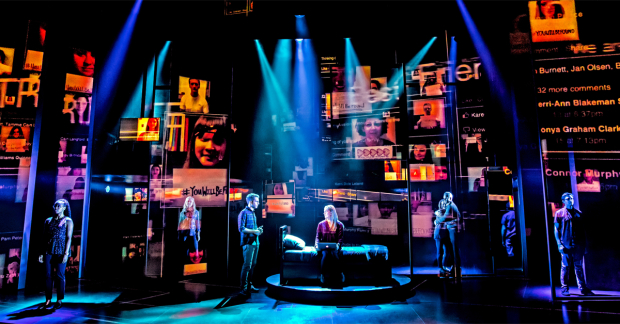How Dear Evan Hansen Became a Novel
Get an inside look at the new book inspired by the Tony-winning musical, and hear an exclusive audio excerpt.
Novelist and musician Val Emmich had a difficult task ahead of him when Steven Levenson, Benj Pasek, and Justin Paul tapped him to turn their Tony-winning musical Dear Evan Hansen into a novel. But the show's scribes gave Emmich everything: their full script, pages of deleted scenes and lyrics, and carte blanche to expand the Evan Hansen universe to suit the form of literature.
Published by Little, Brown Books for Young Readers, Dear Evan Hansen: The Novel is available now in book and audio formats, with Emmich, Levenson, Pasek, and Paul embarking on a national speaking and performance tour to promote the publication. Here, they discuss what it takes to turn a musical into a piece of literature, and why reading the book won't replace the experience of seeing Dear Evan Hansen live.

(© Sasha Illingworth)
As the writers of the original show, what were your goals for Dear Evan Hansen: The Novel? What was it about Val Emmich that made for the perfect fourth collaborator?
Steven Levenson: When the show opened on Broadway, we were so stunned by the response; in particular, we were amazed by the number of people responding to the show who hadn't even seen it. I think we were self-conscious about the fact that a Broadway ticket is not an easy thing to access, and we wanted to find a way to get this story to more people.
At the same time, there were questions about these characters that we had left unanswered that we were always curious about. In a two-and-a-half-hour musical, you have to narrow your focus such that you can't go down a lot of roads and explore tangents. All of those things coalesced to make us think about a novel.
Benj Pasek: We know that when you're trying to adapt one form into another, you need somebody who really understands that form. Not only has Val written novels before, in a style and voice that really resonated with us, but he's also a musician. He understands how to novelize a story and also what the power of music can do in storytelling.

(© Matthew Murphy)
Val, how did you go about making this story your own, especially when it came to adapting the score into prose form?
Val Emmich: They gave me everything: deleted scenes, deleted song lyrics. The first Dear Evan Hansen anything I received was the [script], and immediately, I thought it could be a novel. Then I saw the show and I thought less so that it could be a novel. It really attacks you from all angles, with the music, the amazing acting, the innovative production qualities, and on top of that, the really passionate audience response. But I met the guys and they seemed open to having it be something that explored different things than the show did.
I tried at first to insert lyrics from the show. I was thinking, as an audience member, that I would want there to be some kind of nod to the songs. But the guys found that to be inorganic. I tried some other ways. Zoe was a natural way in, because she's a musician. I went deeper into her goals and what she gets out of music, the therapeutic quality, and that led to a way of representing a song from the show.
At the climax of the story, there was a point where Evan wasn't as emotionally demolished as much as he is in the show, and they wanted more of that. I kept listening to one song in particular, "Words Fail," and I thought, "How can I do this on the page?" So the music was honored in a literal way and as an emotional guide, to know what a character was going through at a place in the story.
Justin Paul: The question in our heads was, "How do you take a moment that's so emotional and so experiential in a live format and put it into prose?" Val's musicianship as a songwriter gave us confidence, but from the get-go, we always said we're not trying to capture the show as a book. We're not trying to replace the experience of seeing the show. There were moments where we wanted the same energy and feeling from a song, and then moments where we said the novel is going to do its own thing. We view them as complementary experiences, but each is meant to be enjoyed on its own.
Did you take the show's fan base into consideration when creating this book and expanding the Dear Evan Hansen universe?
Benj: Our show changed when it interacted with an audience for the first time. And we've continued to have a dialogue with the audience regarding the book, thinking about what they would want from these characters. They played a big part in how we wanted to dive into the character of Connor especially, but also in how we get to know more about Evan and his mother, and all the family dynamics.
Steven: Without giving too much away, I love what Val has done with Connor and "Mrs. G in second grade." I love the surprising turn it takes in the book, when people realize what they think they know about Connor is not actually the real story.
Justin: It's almost like a joke, the line where Jared says, "Connor Murphy is batsh*t out of his mind. Do you remember when he threw a printer at Mrs. G in second grade, because he didn't get to be line leader that day?" We had always talked about what that really was. It probably wasn't him being a menace; it was probably because he was a kid who had emotions that he couldn't control and had an outburst. We always said there was more to that story.
That was the perfect encapsulation of what this process allowed us to do. Val has gotten into the world and written beautiful and meaningful backstories that help us understand the characters so much more.
Hear an excerpt from the Dear Evan Hansen: The Novel audiobook, read by current tour star Ben Levi Ross:








